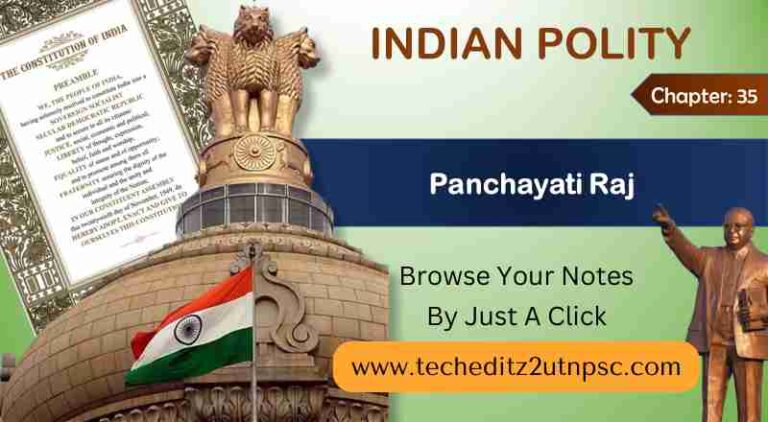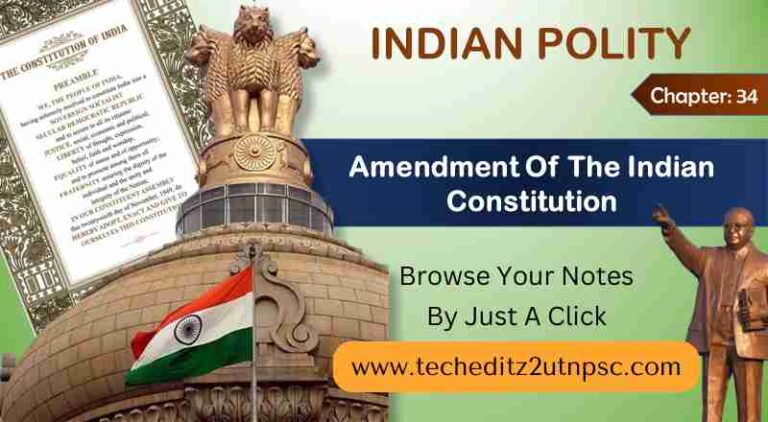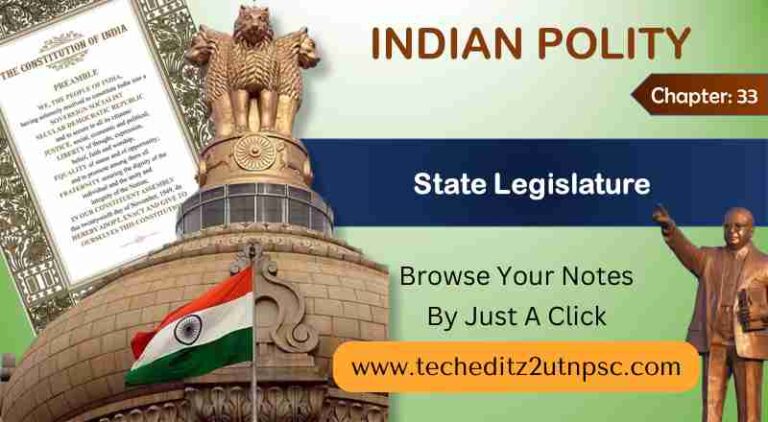support@techeditz2utnpsc.com | 8300-921-521

Directive Principles Of State Policy
Indian Polity
Chapter 9: Directive Principles Of State Policy
- The Directive Principles are the needs of the community.
- DPSP was borrowed from Irish Constitution.
- These are the recommendations to the state in Legislative, Executive and Administrative matters.
- State means Legislative and Executive organs of the Central and State governments, all local authorities and all other public authorities in the country.
- In GOI (Government of India) 1935 Act “Instruments of Instructions” enumerated and in the Indian Constitution they are called Directive Principles of State Policy.
- DPSP embody the concept of a welfare state.
- The Directive Principles are the operative part of the Constitution.
- The Directive Principles of State Policy constitute a very comprehensive economic, social and political program for modern democratic stste.
- The idea of the principles is that realizing the high ideals of Justice, liberty, equality and Fraternity as outlined in the Preamble.
- Directive Principles of State Policy are non-justifiable in nature. (They are not legally enforceable by the courts for their violation).
- Article 36: It defines the state. It has the same meaning as given in Article 12 of Part III (fundamental rights) of the Indian Constitution.
- Article 37: The Directive Principles are “fundamentals in the governance of the country”. It shall be the duty of the state to apply these principles in making laws.
- Article 37 also contains a clause of that mentions the non-justiciability of the Directive Principles.
- It made it clear that the Judiciary should not compel the state to perform a duty under the directive principles of state policy.
- Article 38: The state shall strive to promote the welfare of the people by securing and protecting as effectively as it may a social order in which justice, social, economic and political, shall inform all the institutions of social life.
- Article 38 is the key stone or the core of the Directive principles.
- Article 39: The Right to adequate means of livelihood for all citizens, equal Pay for equal work for both men and women.
- Article 40: To organize Village Panchayats.
- Article 41: Right to work, Public Assistance in the event of unemployment.
- Article 42: The provision for just and humane conditions of work and maternity leave.
- Article 43: Living wage for workers.
- Article 44: Uniform Civil Code for the whole country.
- Article 45: Provision for early childhood care and education to children below the age of 6 years.
- Article 46: Promotion of educational and economic interests of Scheduled Castes,
Article 46: Promotion of educational and economic interests of Scheduled Castes, Scheduled Tribes and other backward classes. - Article 47: To prohibit the consumption of intoxicating drinks and drugs. It is the duty of the state to raise the level of nutrition and the standard of living to improve public health.
- In India Gujarat, Manipur, Mizoram, Nagaland and Lakshadweep prohibited manufacture, sale and consumption of alcohol.
- In Gujarat the law is in force since May 1,1960. Gujarat is the only state in India that has the death penalty for those who found guilty of making and selling spurious (fake) liquor which causes death. This was done by amending the Bombay Prohibition (Gujarat Amendment) Bill 2009.
- The Bombay Prohibition Act 1949 is still in operation in both Maharashtra and Gujarat.
- The Bangaram Island is the only place in Lakshadweep where the consumption is permitted.
Impact of Prohibition in Haryana: After the 1996 assembly elections the HVP (Haryana Vikas Party) imposed ban on liquor by the CM Bansilal and it had a very bad impact in the 1998 Lok Sabha elections where it won only 1 Lok Sabha seat from the state (Out of 10). In the year 1998 the government lifted the ban. - Article 48: Organization of agriculture and animal husbandry and prohibition of cow slaughter.
- Article 49: Protection of monuments, places and objects of National importance.
- Article 50: Separation of Judiciary from Executive.
- Article 51: To promote international peace and security, just and honorable between nations, respect for international law.
- 86th Amendment of 2002 changed the subject matter of Article 45 and also made elementary education a fundamental right under Article 21 A..
- This came into effect on April 1, 2010.
- With this the Children between the age group of 6 and 14 are entitled for free education.
B N Rau (Constitutional advisor) recommended that the rights to be divided into justifiable and non-justifiable. Accordingly Part III and Part IV came into the picture. - In Champakam Dorairajan case (1951) the Supreme Court ruled that in case of any conflict between Fundamental Rights and DPSP, the Fundamental rights would prevail.
- In Golaknath case (1967) the Supreme Court held that Fundamental Rights cannot be amended for the implementation of DPSP.
- In Keshavananda Bharati case (1973): The Supreme Court declared that there is no essential dichotomy between the Fundamental rights and the Directive principles. They complement and supplement each other.
- 42nd amendment of 1976 accorded supremacy to Directive Principles of State Policy over Fundamental rights.
- In Minerva Mills (1980) case the status of Directive Principles of State Policy was made subordinate to the Fundamental rights.
Miscellaneous:
- Dr B R Ambedkar: The Directive Principles are the novel feature of the Indian Constitution.
- The Directive Principles along with the Fundamental rights contain the Philosophy of the Constitution and is the soul of the Constitution.
- Dr Br Ambedkar: A state just awakened from freedom with its many preoccupations might be crushed under the burden unless it was free to decide the order, the time, the place and the mode of fulfilling them.
- Jawaharlal Nehu’s Statement In 1951: The DPSP represent a dynamic move towards a certain objective.
- The Fundamental rights represent something static, to preserve certain rights which exist.
- Both are right. But, somehow and sometime it might so happen that dynamic movement and that static standstill do not quite fit into each other.
- Article 38 is the key of the Directive Principles.
- Dr B R Ambedkar was strongly in favor of Uniform Civil Code.
- In S R Bommai vs Union of India case in 1994 the Supreme Court urged the government to enact a Uniform Civil Code to promote National Integration.
- The Supreme Court (1994) stated that the Article 44 had remained a dead letter.
- The Preamble, Fundamental Rights and the DPSP are the integral parts of the Indian Constitution.
- All the three are meant for building an egalitarian (equal) society and in the concept of socio-economic justice.
- If The Fundamental Rights represent the don’ts, the DPSP represents the Do’s of the executive and legislature then there is conflict.
Jawaharlal Nehu’s Statement In Parliament In 1955:
- The responsibility for economic and social welfare policies of the nation should lie with the Parliament and not with the Courts.
- In case of contradiction it was for Parliament to remove the contradiction and make Fundamental rights sub serve the Directive Principles of State Policy.
A Sessions Court in Delhi on forced marriage of a Muslim woman:
- The statements were given on January 1, 2013 while dismissing an anticipatory bail application moved by a maulvi accused of forcing a young Muslim girl into a wedding with a married man who allegedly raped her subsequently.
- According to maulvi the Shariah permitted a Muslim to keep 4 wives at a time and that the girl consented to the marriage.
- The judge Kamini Lau noted that the girl had not signed the marriage certificate.
- Her parents were not present nor were there any witness.
- According to the judge the Indian Legal system provides sufficient space for religious freedom but whenever any such regressive religious practice come into conflict with the rights of the citizens as enshrined in the Indian Constitution, it becomes obligatory for courts to ensure that it is the majesty of law and the constitutional mandate that prevails.
- Judge made it very clear that in Islamic societies Polygamous marriages are permitted but only in certain circumstances, that is primarily in situations where a man’s death has left his widow with no means or support.
- Polygamy is neither mandatory nor encouraged but merely permitted.
- The Korans conditional endorsement stresses that self interest or sexual desire should not be the reason for entering into a polygamous marriage.
- It is a practical duty that is associated with the social duty of Islamic marriage.
- It is a practical duty that is associated with the social duty of Islamic men to protect the social and financial standing of widow and orphans in their community.
Visit Our YouTube Channel For More Free Videos: Click Here


